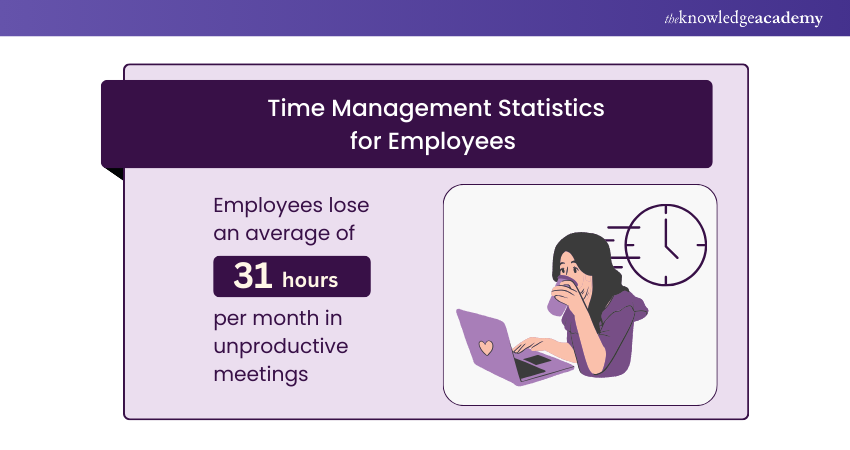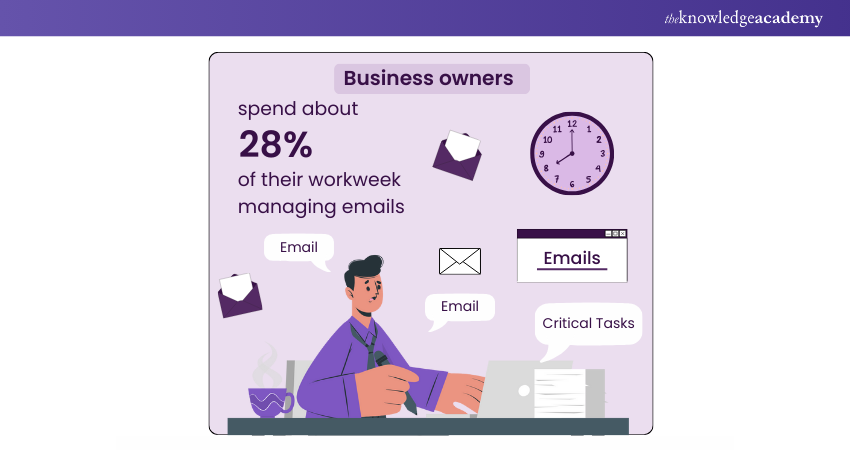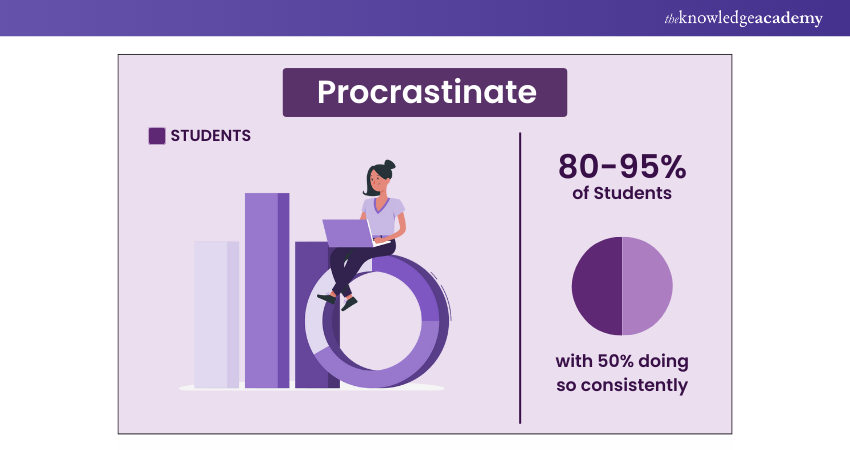We may not have the course you’re looking for. If you enquire or give us a call on +800 312616 and speak to our training experts, we may still be able to help with your training requirements.
We ensure quality, budget-alignment, and timely delivery by our expert instructors.

Time Management is a key skill that impacts productivity and overall well-being across various industries. Did you know that employees spend nearly 57% of their time communicating through emails, meetings, and chats? Additionally, 80% of people feel stressed due to poor Time Management.
This blog discusses unique Time Management Statistics, exploring how different sectors tackle time-related challenges. From creative industries to healthcare, we cover the unique strategies and tools that professionals use to stay on top of their tasks. Join us as we decode the digits and empower you to master the art of seizing the day!
Table of Contents
1) What is Time Management?
2) Time Management Statistics
a) Time Management Statistics for Employees
b) Time Management Statistics for Business Owners
c) Time Management Statistics for Students
3) Time Management in Different Industries
4) Conclusion
What is Time Management?
Time Management is the process of planning and controlling how much time to spend on specific activities. It helps individuals and organisations use their time effectively to accomplish goals and tasks. By managing time well, people can work smarter rather than harder, making the most of their available time.
Effective Time Management involves setting priorities, creating schedules, and staying organised. This practice can lead to increased productivity, reduced stress, and better work-life balance.
Time Management Statistics
Understanding Time Management Statistics can provide valuable insights into how effectively we use our time. These statistics highlight the impact of Time Management on productivity, stress levels, and overall success in various aspects of life. Let’s explore some in detail:
Time Management Statistics for Employees
Time Management is important for improving productivity and reducing stress in the workplace. Here are some statistics that highlight the importance of effective Time Management for employees.

a) Time Tracking: Only 17% of people track their time, but those who do report significantly higher productivity levels. Proper time tracking can help identify time-wasting activities and improve overall efficiency.
b) Interruptions: The average employee faces 56 interruptions per day, which drastically impacts their ability to manage time effectively and maintain focus on tasks.
c) Email Overload: Employees spend about 28% of their workweek managing emails, which can detract from more critical tasks. This highlights the need for better email management strategies to save time (McKinsey Global Institute).
d) Procrastination: Around 20% of adults regularly procrastinate, which affects their overall Time Management and productivity. This statistic underscores the importance of adopting effective Time Management Techniques to combat procrastination.
e) Social Media Usage: Employees spend approximately 12% of their daily working hours on social media, which can be a significant distraction and a major Time Management challenge (Zippia).
f) Work-Life Balance: 39% of employees report that poor Time Management negatively impacts their work-life balance, leading to increased stress and burnout. Effective Time Management practices are crucial for maintaining a healthy balance between work and personal life.
Time Management Statistics for Business Owners
Time Management is essential for business owners to improve efficiency and drive success. Here are some statistics that show how Time Management can make a big difference.

a) Inefficiency in Administrative Tasks: Business owners and CEOs often spend 40% of their time on routine tasks, which they find inefficient. Automating repetitive processes could save a significant amount of time, freeing them up for more strategic activities (PwC’s Annual Global CEO Survey).
b) Cost of Poor Time Management: It can lead to substantial financial losses. For example, businesses lose approximately £441 billion annually due to workplace distractions, highlighting the critical need for better Time Management practices.
c) Procrastination Impact: About 20% of adults regularly procrastinate, affecting their efficiency and business outcomes. Implementing structured Time Management techniques can help mitigate this issue, boosting overall productivity (Zippia).
d) Time Spent on Emails: Business owners spend about 28% of their workweek managing emails, which can detract from more critical tasks. Improving email management strategies can significantly enhance time efficiency and productivity.
Time Management Statistics for Students
Effective Time Management is important for students to balance their academic and personal lives. Here are some key statistics that highlight how Time Management impacts students' performance and well-being.

a) Time Spent on Coursework: Nearly 47.7% of students spend less than 60 minutes per day on their coursework. This suggests that many students may need better Time Management Strategies to handle their academic responsibilities effectively.
b) Procrastination: Around 80-95% of students procrastinate to some degree, with about 50% doing so consistently. This habit increases stress and lowers academic performance, making it essential for students to develop better Time Management skills.
c) Distractions: Students frequently face distractions, spending about 2 hours daily on social media during study time. Minimising these distractions can significantly enhance their focus and improve academic outcomes.
d) Study Techniques: Students who use structured study techniques, such as time blocking or the Pomodoro Technique, report feeling more in control of their workload. These methods help improve productivity and reduce the feeling of being overwhelmed.
e) Sleep and Academic Performance: Students who manage their time well tend to get more sleep and perform better academically. Poor Time Management often results in late-night studying and reduced sleep quality, which negatively impacts academic success.
Learn how to deal with stress with our Stress Management Course – Join today!
Time Management in Different Industries
Time Management varies greatly across different industries due to unique challenges and demands. Each sector requires specific techniques to optimise productivity and efficiency. Understanding these factors can help professionals manage their time more effectively and achieve better results. Let's explore:
Creative Industries
a) Creative professionals often juggle multiple projects, making Time Management essential.
b) Techniques like the Kanban method help visualise workflows and boost productivity.
Technology Sector
a) Tech companies use automation and productivity tools to track time and optimise workflows.
b) Practices like asynchronous communication and minimising distractions are common.
Healthcare Industry
a) Healthcare professionals face time constraints due to patient care, documentation, and administrative tasks.
b) Effective Time Management is crucial for providing timely and high-quality patient care.
Education Sector
a) Teachers and professors manage tight schedules with multiple classes and assignments.
b) Techniques like scheduling, prioritising tasks, and using to-do lists are vital.
c) Managing student workload and providing timely feedback are key aspects.
Finance and Banking
a) Financial professionals work with tight deadlines and high-stakes transactions.
b) Techniques like the Pomodoro method and timeboxing help manage tasks and reduce stress.
c) Prioritising tasks based on urgency and importance is crucial.
Manufacturing and Logistics
a) Production schedules and delivery timelines are critical in this industry.
b) Techniques like Gantt Charts and the Critical Path Method (CPM) help optimise production and logistics.
c) Managing inventory, supply chain, and employee schedules are key aspects.
Government and Public Sector
a) Public sector employees often work with tight budgets and multiple stakeholders.
b) Techniques like prioritising tasks, delegating, and using project management tools are essential.
c) Managing multiple projects and ensuring transparency in reporting are critical.
Retail and Sales
a) Retail employees work with tight schedules and multiple customer interactions.
b) Techniques like scheduling, prioritising tasks, and using to-do lists are essential.
c) Managing customer interactions, inventory, and sales targets are key aspects.
Transportation and Travel
a) Professionals in this industry work with tight schedules and complex logistics.
b) Tools like Gantt Charts and the Critical Path Method (CPM) help optimise schedules and logistics.
c) Managing flight schedules, passenger flow, and vehicle maintenance are critical aspects.
Achieve your goals with our Attention Management Training – Join today!
Conclusion
Effective Time Management is important for success in both personal and professional spheres. The Time Management Statistics highlighted in this blog demonstrate the significant impact on productivity, stress levels, and overall success for students and business owners. By understanding and implementing better Time Management strategies, individuals can enhance their efficiency and achieve a healthier work-life balance.
Transform your efficiency with our Time Management Training – Join today!
Frequently Asked Questions
How can you Improve Your Time Management?

Improving your Time Management involves setting clear goals, prioritising tasks, and using tools like calendars and to-do lists to stay organised. Additionally, breaking tasks into smaller steps and avoiding multitasking can help you stay focused and efficient.
Why is Time Management Important?

Time Management is important because it increases productivity by helping you focus on high-priority tasks. It also reduces stress by allowing you to manage your workload more effectively. Lastly, good Time Management leads to better work-life balance, giving you more time to relax and enjoy personal activities.
What are the Other Resources and Offers Provided by The Knowledge Academy?

The Knowledge Academy takes global learning to new heights, offering over 3,000 online courses across 490+ locations in 190+ countries. This expansive reach ensures accessibility and convenience for learners worldwide.
Alongside our diverse Online Course Catalogue, encompassing 19 major categories, we go the extra mile by providing a plethora of free educational Online Resources like News updates, Blogs, videos, webinars, and interview questions. Tailoring learning experiences further, professionals can maximise value with customisable Course Bundles of TKA.
What is the Knowledge Pass, and How Does it Work?

The Knowledge Academy’s Knowledge Pass, a prepaid voucher, adds another layer of flexibility, allowing course bookings over a 12-month period. Join us on a journey where education knows no bounds.
What are Related Courses and Blogs Provided by The Knowledge Academy?

The Knowledge Academy offers various Personal Development Courses, including the Stress Management Course, Attention Management Course, and Time Management Course. These courses cater to different skill levels, providing comprehensive insights into Getting Back into Work.
Our Business Skills Blogs cover a range of topics related to Time Management, offering valuable resources, best practices, and industry insights. Whether you are a beginner or looking to advance your Time Management skills, The Knowledge Academy's diverse courses and informative blogs have got you covered.
Upcoming Business Skills Resources Batches & Dates
Date
 Time Management Training
Time Management Training
Fri 9th May 2025
Fri 11th Jul 2025
Fri 12th Sep 2025
Fri 14th Nov 2025






 Top Rated Course
Top Rated Course



 If you wish to make any changes to your course, please
If you wish to make any changes to your course, please


